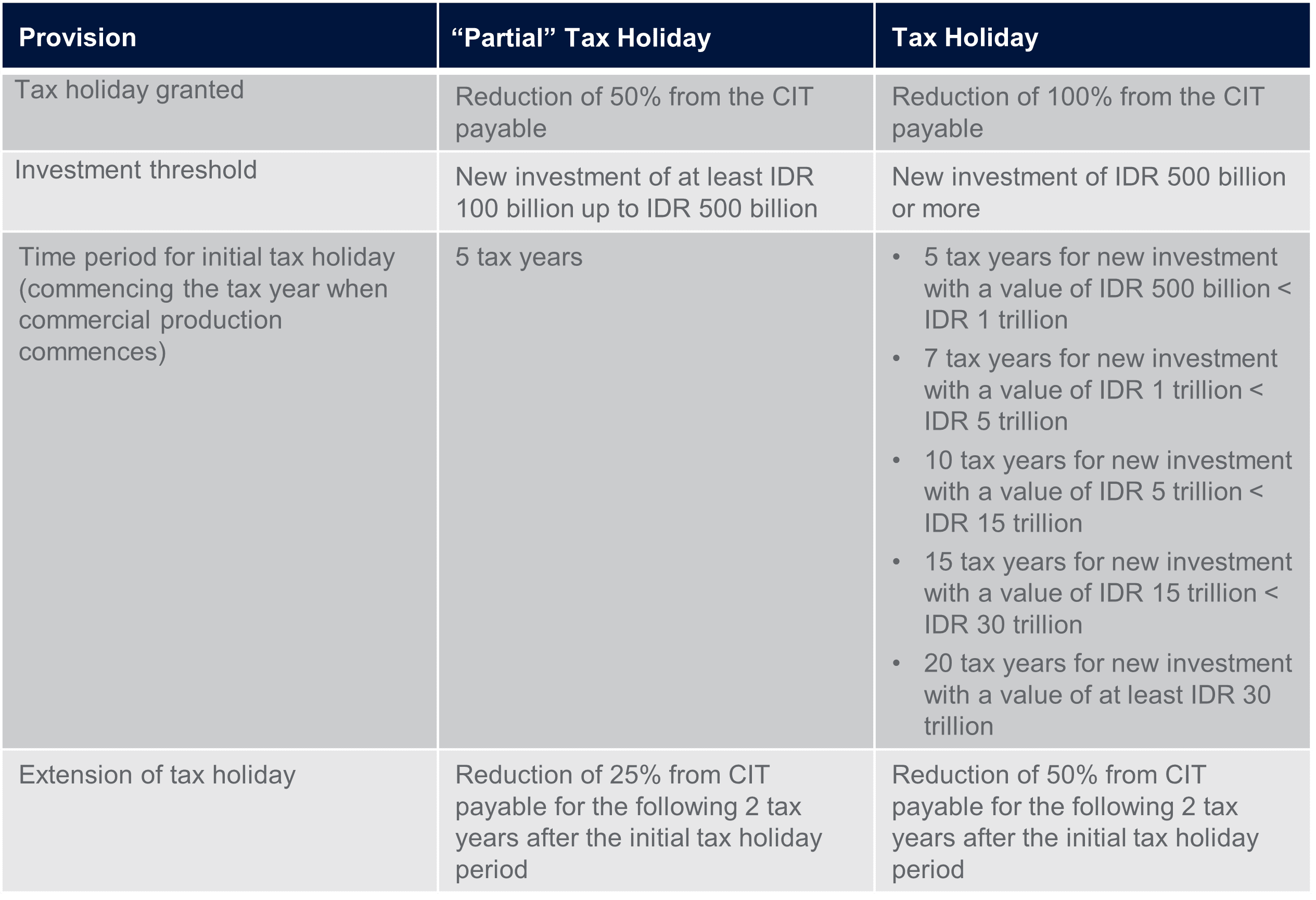RSM INDONESIA CLIENT ALERT – 18 November 2024
On 9 October 2024, the Minister of Finance (“MoF”) issued Regulation No 69 Year 2024 concerning Amendment of MoF Regulation No. 130/PMK.010/2020 concerning Provision of Facility for Reduction of Corporate Income Tax (“PMK-69” and, together with MoF Regulation No. 130/PMK.010/2020, the “Tax Holiday Regulations”).
The Tax Holiday Regulations provide a facility for eligible investors to reduce the amount of corporate income tax (“CIT”) otherwise due by either 50% or 100% for a period of up to 20 tax years, depending on the amount of the investment. Eligible investors are either investors intending to invest in specified Pioneer Industries or those that are investing in non-Pioneer Industries that can demonstrate the proposed investment achieves a score of at least 80 points against the quantitative criteria specified in the Tax Holiday Regulations.
PMK-69’s main purpose is to extend the opportunity for investors to apply for a facility for reduction of CIT (“tax holiday”) until 31 December 2025 and to incorporate potential revisions to the tax holiday benefit if an investor is subject to Global Minimum Tax under Pillar Two of the international tax rules developed by the OECD. PMK-69 also updates the Tax Holiday Regulations to reflect recent laws and regulations, and to reflect changes to the tax administration system following the implementation of Coretax.
WHEN IS PMK-69 APPLIED?
PMK-69 starts to apply on 9 October 2024.
Eligible investors can submit applications for tax holidays until 31 December 2025.
WHAT ASPECTS OF THE EXISTING TAX HOLIDAY REGULATION IS AMENDED BY PMK-69?
There are no changes to the substantive provisions (e.g. investment threshold, reduction of CIT, and time-period of the tax holiday). For reference, these are summarized in the table below:

Some of the minor revisions under PMK-69 are provisions to recognize:
- The OSS licensing system can now receive applications and therefore all applications must be in digital format through the OSS licensing system. The same also applies for reporting.
- The tax facilities offered for investments in Ibu Kota Nusantara (“IKN”). If an investor has received a tax holiday under the special regime for IKN then the investor cannot also obtain a tax holiday under the Tax Holiday Regulations.
- A fiscal certificate (“Surat Keterangan Fiskal - SKF”) is required for the applicant company in addition to the shareholders (if those shareholders are domestic taxpayers). SKF are available automatically through the tax administration system.
POTENTIAL IMPACT OF PILLAR TWO - GLOBAL MINIMUM TAX
The Global Minimum Tax ensures that multinational enterprises (“MNE”) that have consolidated annual revenues of EUR 750 million or more pay a minimum level of tax on each jurisdiction in which they operate. The implementation of Pillar Two is expected to reduce competition for investment via corporate tax rates that encouraged tax arbitrage (including transfer pricing) and potentially diverted investment from those countries that most needed it but could not compete due to fiscal constraints.
The primary mechanism that Pillar Two applies is a Global Minimum Tax where an MNE will be required to pay additional tax if its global minimum tax rate is less than 15%. In effect, Pillar Two is intended to ensure that these MNE pay at least 15% tax globally.
The existence of a tax holiday for such a MNE could result in that MNE paying no CIT in Indonesia but then, effectively, giving some of the tax holiday benefit back to its home jurisdiction in the form of a top-up tax paid in that jurisdiction (up to 15%).
To avoid this result, PMK-69 provides that further regulations can be issued so that, if the MNE is subject to the Global Minimum Tax, then Indonesia will seek to adjust the tax holiday benefit so that the home jurisdiction does not receive CIT that Indonesia has forgone under the tax holiday (in effect Indonesia will impose some CIT).
At this time, it is not known how this will be regulated.
RECOMMENDED ACTIONS/COMMENTS:
- For the entity within the scope, the imposition of Global Minimum Tax on MNE will reduce the benefit of the tax holiday and potentially lead to a change of investment plans and/or tax strategy.
- The approval of a tax holiday is in advance of actual investment realization and will be subject to post-audit. Taxpayers must ensure they maintain documentation confirming the amount of new investment realized and that this investment relates to the Pioneer Industry or the non-Pioneer Industry that was approved for the tax holiday. Further, if the investment was for an approved non-Pioneer Industry, then documentation is required to support the original score of 80 points or more.
Taxpayers that have received the tax holiday are still required to comply with the post-approval obligations regarding realization of new investment, conducting the agreed business activities and not transferring any of the fixed assets to another party. Failure to do so can result in a reduction to the tax holiday period (if the actual realized investment is less than planned but still IDR 100 billion or more), or the loss of the tax holiday, imposition of CIT and penalties (if the actual realized investment is below IDR 100 billion, or if the actual business activity is not the approved Pioneer Industry or non-Pioneer Industry).


